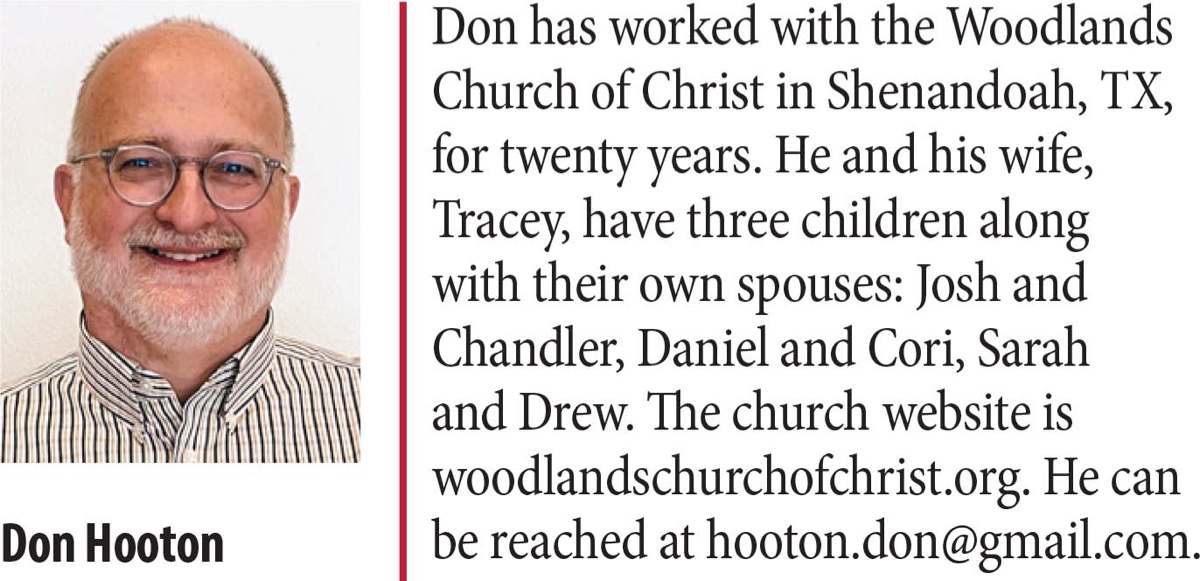
by Don Hooton
How do we handle the sorrow when a loved one dies? Though hope exists for our tomorrow, we must allow ourselves (and others) to grieve now to get to tomorrow’s hope. [Note: Don lost his father during the COVID pandemic.]
Job said, “Man, who is born of woman, is short-lived and full of turmoil” (14:1), because life under the sun is punctuated with loss and grief. Though grief is caused by other things, death is the most common for us all. Christians know that Jesus broke “the power of him who holds the power of death—that is, the devil—and [has] free[d] those who all their lives were held in slavery by their fear of death” (Heb. 2:14-15). Indeed, His resurrection and victory over death have set this certainty in our hope. For, “God raised Him up again, putting an end to the agony of death, since it was impossible for Him to be held in its power” (Acts 2:24). Christians know the grave is not final. We know that believers will always be with the Lord (1 Thess. 4:17), and with that, we can “therefore comfort one another with these words” (1 Thess. 4:18).
And yet, though we know hope exists for our tomorrow, today we grieve.
It was felt by King David at his son’s side. No doubt it was felt by Mary at her son’s cross. It is a wholly natural and healthy response, whether we believe or not. We should expect to experience surprising difficulties and uncomfortable emotions: shock, confusion, anxiety or even depression. Of course, this will make our lives feel messy and complicated. Still, through it all, Christians can learn to cope with hope. To get to that hope, however, we must work through the arduous process of grief, a very hard road that must be traveled, or we will face residual damage. I know grief. Like many, I lost someone this year to the pandemic—my dad. Recently, I lost a very close friend, a young preacher intern, to cancer. The notices of death do not slow down as our age goes up. While death will be swallowed up in victory on the Great Last Day, Death still stings. Christ is the hope—the only hope—for victory over death (1 Cor. 15:50ff). So here we stand, dealing with death and grief as we walk on to hope.
The journey from grief to hope takes time. For those who grieve, there is never enough time. For those outside, impatience often grows against the grieving so that they are told, as I was once, “just get over it.” If it is true that love takes time, it will also be true that letting go of that bankroll of love now stolen will take at least a complementary amount of time. If we “don’t hurry love,” we should also say, “don’t hurry grief.” Grief is the price we pay for love. It is the confusion caused by not knowing how to love someone who is gone. It is love’s frustration, bitterness, anger, and resentment at death’s destruction. It only exists where love once lived. Grief is love’s unwillingness to give up. It will take time.
Further, grief is just one manifestation of life as a human. As free moral agents, our choices may lead to blessing—or suffering. James certainly saw that tests could bring endurance, even joy (1:2-3), and there certainly could be “higher purposes” that are often realized after the death of a loved one in our “acceptance.” Sadly, though, it is often the very first thing that we “comforters” try to say to “comfort” the griever. In their grief, they don’t need to find the greater purpose; they need to grieve through these stages of grief: (1) shock or disbelief, (2) denial, (3) bargaining, (4) guilt, (5) anger, (6) depression, and finally, (7) acceptance and hope (medicine.net). As noted above, everyone will move through them in their own way and timeline. So, when Paul says, “that you may not grieve” (1 Thess. 4:13), he is not telling Christians to never grieve; but to handle grief as those who are informed from a gospel perspective. Christians should experience grief but without prolonged despair, experience sorrow but without prolonged defeat, and experience sadness but without prolonged hopelessness. Whether it is episodes of anger or comfort, solace or busyness, everyone will process their healing in the way that brings comfort. Remember, to get to hope, we still must start with grief . We need to let people do the same.
If grief threatens to overwhelm, though, try saying with the psalmist, “My soul weeps because of grief; strengthen me according to your word” (Ps. 119:28). Don’t forget to keep communing with God in Scripture—even one little verse at a time—to work through grief. For “those who wait for the Lord will gain new strength” (Isa. 40:31). So, how do we get to hope?
The first task is accepting the reality of the loss, even if it was quick, as well as overcoming the shock and denial. “Seeing is believing” truly facilitates grief. It’s no use “not looking” and it’s even less useful—even harmful—to “not talk” about it. Talking about the deceased or the circumstances surrounding their death can help everyone. While the stark reality of their absence may painfully grip our hearts when we do this, it is the best step closer to hope.
We must also allow ourselves to experience grief’s pain. Some bottle up emotions or reject thoughts, while others pour their emotions from bottles or reject people they love. The only way to move through grief to hope is to experience fully that pain—most often through tears. Jesus wept over the loss of His friend Lazarus, even though He knew He would raise him from the dead. This permits us to weep (and we should allow those who grieve to weep). Experience the pain of grief—don’t suppress it.
We must then adjust our environment. Sometimes we assume some of the social roles performed by the deceased, or we find others who will. For example, a grieving spouse may need help with household chores and cooking. Someone who never learned to drive must find other forms of transportation. Even though the widower or widow is no longer sitting home alone, her/she will regularly be reminded of the deceased. Yet, it is still the better alternative to get us from grief to hope. The goal is not to forget the person who died; it is finally to reach the point where you can remember your loved one—even with sad longing—but without experiencing disabling grief.
Don’t be discouraged if things get worse before they get better. If our knee is going to heal after a sports injury, we’re going to have to do the painful work of rehab. If we’re going to get stronger, we’re going to have to experience the soreness that comes from work outs. If a broken bone is going to heal, we’re going to have to endure the pain of setting the bone. The same is true in grief; pain precedes healing and restoration. Even as it was for Paul and his thorn, God’s grace will help us withstand the tides of sadness (cf. 2 Cor. 12:9). In the depths of grief, God’s presence and grace will allow us to feel the sadness and lament without ultimately being consumed by it. With each tear we cry, we move closer to healing by the sufficiency of His grace. God told Israel, “In repentance and rest you will be saved, in quietness and trust is your strength” (Isa. 30:15). We must rely on God’s healing grace so that we can finally move on to hope through the comfort and strength grace brings. We cannot mend our hearts alone; but God can. So utilize His help!
Then, you can “move on.” This is the last step beyond grief. It is where we can step forward and live again with the memories—even when the painful longing remains—yet without the grief. While it will not unfold the same as it does for a widow like it does a parent—or like it does a child or a friend, the process will bring healing from the difficulties that death brings. When we follow these processes after death, we will once again see and feel that there is reason again for hope. Remember, “hope does not disappoint” (Rom. 5:8). 


